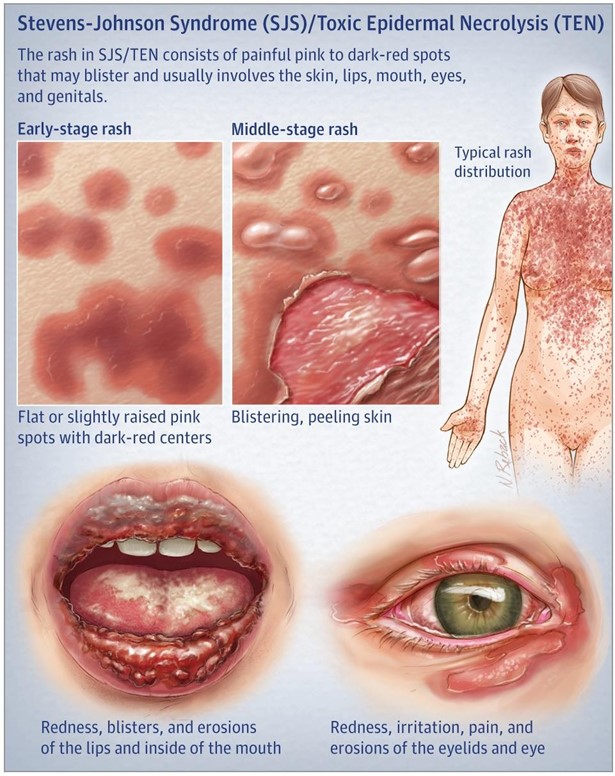A nurse is reinforcing teaching with a client who is taking allopurinol about the risk for developing Stevens-Johnson syndrome.
For which of the following manifestations should the nurse instruct the client to monitor and report?
Tinnitus with ear pain
Hyperreflexia
Skin rash with fever
Diplopia
The Correct Answer is C
Explanation
C. Skin rash with fever
Stevens-Johnson syndrome (SJS) is a severe and potentially life-threatening hypersensitivity reaction that can occur as a rare side effect of certain medications, including allopurinol.
Monitoring and early recognition of SJS symptoms are crucial for prompt medical.
Skin rash with fever is a hallmark manifestation of Stevens-Johnson syndrome. It often starts with flu-like symptoms such as fever and malaise, followed by the appearance of a widespread, painful, and rapidly progressing rash. The rash typically involves the mucous membranes, including the mouth, nose, and eyes, and can be accompanied by blisters or sores. Prompt reporting of these symptoms is critical for early diagnosis and intervention.
Tinnitus with ear pain in (option A) is incorrect because it is not typically associated with Stevens- Johnson syndrome. It may indicate another condition or side effect unrelated to SJS.
Hyperreflexia, which refers to abnormally increased reflexes, in (option B) is incorrect because it is not a characteristic manifestation of Stevens-Johnson syndrome. It may indicate a neurological condition or reaction to another medication, but it is not specific to SJS.
Diplopia, or double vision, in option (D) is incorrect because it is not commonly associated with Stevens- Johnson syndrome. It may be caused by other ocular or neurological conditions.
In summary, the nurse should instruct the client taking allopurinol to monitor and report the manifestation of a skin rash with fever. This is important because it may indicate the development of Stevens-Johnson syndrome, a severe and potentially life-threatening reaction to the medication. Early recognition and medical intervention are crucial to minimize complications and ensure appropriate treatment.

Nursing Test Bank
Naxlex Comprehensive Predictor Exams
Related Questions
Correct Answer is A
Explanation
Explanation
A. Write the information at an 8 th grade reading level
Writing the information at an 8th-grade reading level ensures that it is accessible and understandable to a wide range of individuals in the community. Hypertension is a common health condition, and it is important to provide information in a clear and concise manner that can be easily comprehended by the target audience.
Explaining medical terminology using basic, one-syllable in words in (option B) is not recommendable because it may oversimplify the information and potentially undermine the importance of accuracy and precision in healthcare communication.
Using a 12-point font size in (option C) is not recommendable because it is a general guideline for readability, but it is not the most critical aspect when developing a brochure. The readability of the content itself is more important than the specific font size.
D. Presenting information from complex to simple in (option D) is not recommendable because it is not the most effective approach when developing a brochure about hypertension. It is more beneficial to present information in a simple and straightforward manner from the beginning to enhance understanding and engagement.
Therefore, the nurse should write the information at an 8th-grade reading level (option A) to ensure that it is easily accessible and comprehensible for the target audience.
Correct Answer is B
Explanation
In Islam, it is customary to position the deceased's head toward Mecca, which is considered the holiest city in Islam. Mecca is the direction toward which Muslims face during prayer. Orienting the client's head toward Mecca is a sign of respect for their religious beliefs and customs.
While it is common in some cultural and religious practices for family members to stay with the deceased until burial, this may vary depending on the specific beliefs and customs of the family. It is important to respect the family's wishes and cultural practices, but it is not solely specific to Islam.
The duration of time for a family member to stay with the deceased can vary depending on cultural and religious practices, but there is no specific set duration of 8 hours in Islamic customs.
In Islam, the direction of Mecca is significant, and positioning the client's head toward Mecca is the customary practice. There is no specific requirement to position the head northward in Islamic customs.
Whether you are a student looking to ace your exams or a practicing nurse seeking to enhance your expertise , our nursing education contents will empower you with the confidence and competence to make a difference in the lives of patients and become a respected leader in the healthcare field.
Visit Naxlex, invest in your future and unlock endless possibilities with our unparalleled nursing education contents today
Report Wrong Answer on the Current Question
Do you disagree with the answer? If yes, what is your expected answer? Explain.
Kindly be descriptive with the issue you are facing.
